Anti-ragging crusader
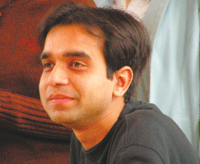 Harsh Agarwal, convenor, Coalition to Uproot Ragging from Education (CURE), Delhi. An alumnus of DelhiUniversity and a consultant with the Planning Commission, Agarwal launched CURE together with Varun Agarwal (alumnus of MIT, USA) and Mohit Garg (IIT-Bombay) in 2001. Currently CURE publishes an anti-ragging newsletter with a national readership and maintains a related website (www.noragging.com) which highlights ragging atrocities.
Harsh Agarwal, convenor, Coalition to Uproot Ragging from Education (CURE), Delhi. An alumnus of DelhiUniversity and a consultant with the Planning Commission, Agarwal launched CURE together with Varun Agarwal (alumnus of MIT, USA) and Mohit Garg (IIT-Bombay) in 2001. Currently CURE publishes an anti-ragging newsletter with a national readership and maintains a related website (www.noragging.com) which highlights ragging atrocities.
Agarwal became the poster-boy of a national anti-ragging (bullying) campaign after he withdrew from M.L.N.MedicalCollege, Allahabad in 2000 because of severe ragging by senior students of the college. Agarwal’s two-year struggle against the system is perhaps the longest battle fought by a ragging victim in Indian history and has been acknowledged in a book titled The Avatar Way of Leadership authored by Harsh Verma (Rupa & Co 2006).
Since 2001, CURE has successfully generated mass awareness of the evils of the ragging tradition which has blighted the lives of tens of thousands of students entering India’s institutions of higher education in particular. In 2006 Agarwal was appointed an advisor to the Raghavan Committee on Ragging, constituted by the Union HRD ministry following a directive of the apex court. In May 2007 the Raghavan Committee’s recommendations were reviewed and approved by the Supreme Court and are the law of the land •
In search of world-class status
.gif) Prof. R. Sethuraman, vice-chancellor, Shanmugha Arts, Science, Technology and Research Academy (SASTRA) Deemed University, Thanjavur. An alumnus of the University of Madras, R. Sethuraman served with the public sector Indian Overseas Bank for 18 years in senior positions before taking charge as chairman of the Shanmugha College of Engineering promoted by his late father S. Ramachandra Iyer in 1984. Since then the college has experienced continuous growth in academic and professional stature. It was renamed Shanmugha Arts Science, Technology and Research Academy (SASTRA) in January 2001 culminating in SASTRA being conferred deemed (i.e. autonomous) university status by the Delhi-based University Grants Commission three months later.
Prof. R. Sethuraman, vice-chancellor, Shanmugha Arts, Science, Technology and Research Academy (SASTRA) Deemed University, Thanjavur. An alumnus of the University of Madras, R. Sethuraman served with the public sector Indian Overseas Bank for 18 years in senior positions before taking charge as chairman of the Shanmugha College of Engineering promoted by his late father S. Ramachandra Iyer in 1984. Since then the college has experienced continuous growth in academic and professional stature. It was renamed Shanmugha Arts Science, Technology and Research Academy (SASTRA) in January 2001 culminating in SASTRA being conferred deemed (i.e. autonomous) university status by the Delhi-based University Grants Commission three months later.
Currently the university, which celebrated its silver jubilee in 2007-2008, offers internationally benchmarked high quality technology, science, teacher training and business management education to its 8,000 enrolled students instructed by a faculty of 700. During the past quarter century in its various avatars this institution, which offers flexible curriculums in eight schools of excellence supported by contemporary infrastructure, has contri-buted 10,000 highly-qualified engineers to the national pool. With an aggregate investment of Rs.150 crore over 25 years, SASTRAUniversity has established six autonomous state-of-the-art centres of research.
‘Our objective is not only to contribute highly trained engineering and technical talent to Indian industry to enable it to improve productivity but also to be acknowledged as a world class research university engaged in creation of new knowledge to improve the quality of life of the people of India,” says Sethuraman •
Professional education leaders
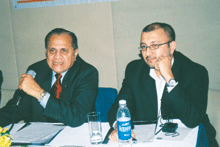 Dr. Ramdas Pai, chancellor of Manipal University and Dr. Ranjan Pai, chief executive and Anand Sudarshan, president of the Manipal Education Group (MEG). Since taking charge of MEG following the death of the legendary Dr. T.M.A. Pai (1889-1979), who pioneered the concept of self-financed, privately promoted institutions of professional education and famously promoted the Kasturba Medical College, Manipal in 1953, Dr. Ramdas Pai has steered the growth and development of Manipal University (formerly the Manipal Academy of Higher Education) into India’s largest private provider of internationally acceptable medical, engineering and professional (nursing, pharmacy, business management, communications) education.
Dr. Ramdas Pai, chancellor of Manipal University and Dr. Ranjan Pai, chief executive and Anand Sudarshan, president of the Manipal Education Group (MEG). Since taking charge of MEG following the death of the legendary Dr. T.M.A. Pai (1889-1979), who pioneered the concept of self-financed, privately promoted institutions of professional education and famously promoted the Kasturba Medical College, Manipal in 1953, Dr. Ramdas Pai has steered the growth and development of Manipal University (formerly the Manipal Academy of Higher Education) into India’s largest private provider of internationally acceptable medical, engineering and professional (nursing, pharmacy, business management, communications) education.
Certified India’s first multi-disciplinary, multi-campus deemed (private) university in 1993, MAHE was officially transformed into ManipalUniversity in 2006. Over the past half century, the low profile MEG (which includes ManipalUniversity) has acquired a global reputation for delivering high quality medical education and at the invitation of the governments of Malaysia, Antigua and Nepal, has established state-of-the-art medical colleges-cum-teaching hospitals in these countries.
Today MEG comprises 55 institutions of education with an aggregate enroll-ment of 125,000 students instructed by a 1,500-strong faculty in India. Of this aggregate enrollment, 100,000 students spread over 53 countries are enrolled in distance education programmes.
Moreover under Dr. Ranjan Pai, chief executive and Anand Sudarshan, president, MEG has expanded its range of education services to provide profes-sional and skills education through eight centres across India; acquisition of a majority equity stake in the Singapore-based U21 Global (the world’s premier online business management university) and Merit Trac (India’s largest skills assessment company). Also on the MEG drawing board is the establishment of India’s first private university for the children of NRIs (non-resident Indians) in suburban Bangalore •
Inspired institution developers
 Dr. Augustine and Mme Grace Pinto, chairman and managing director respectively of the Ryan International Group of Institutions (RIGI). An economics graduate of Loyola College who began his professional career as an English language teacher in suburban Mumbai in 1983, Augustine Pinto (together with wife Grace) promoted their first KG-class V school in Borivali East in Mumbai with a complement of a few dozen students. Since then, within the span of a quarter century, they have nurtured and expanded RIGI into the country’s largest chain of 114 private sector wholly-owned primary-cum-secondary schools with an aggregate enrollment of over 200,000 students in 15 states of the Indian Union. Offering highly prized English medium ‘convent’ education at affordable prices to the country’s aspirational middle class, especially in suburban India, during the past 25 years, RIGI has injected an estimated 125,000 holistically-educated school leavers (classes X and XII) into the bloodstream of the Indian economy.
Dr. Augustine and Mme Grace Pinto, chairman and managing director respectively of the Ryan International Group of Institutions (RIGI). An economics graduate of Loyola College who began his professional career as an English language teacher in suburban Mumbai in 1983, Augustine Pinto (together with wife Grace) promoted their first KG-class V school in Borivali East in Mumbai with a complement of a few dozen students. Since then, within the span of a quarter century, they have nurtured and expanded RIGI into the country’s largest chain of 114 private sector wholly-owned primary-cum-secondary schools with an aggregate enrollment of over 200,000 students in 15 states of the Indian Union. Offering highly prized English medium ‘convent’ education at affordable prices to the country’s aspirational middle class, especially in suburban India, during the past 25 years, RIGI has injected an estimated 125,000 holistically-educated school leavers (classes X and XII) into the bloodstream of the Indian economy.
Deeply religious Christians, the Pintos attribute the rapid growth and development of RIGI into India’s largest school chain to divine inspiration and guidance. But evidently divine inspiration has been supplemented with determined and skillful institution development efforts. In the EW Survey of Schools 2007, Ryan International, Goregaon was ranked the No.1 day school in Maharashtra. And although in the more rigorous EW Survey of Schools 2008, its ranking slipped to fifth in Mumbai, RIGI was the only group with schools ranked high in the west, northern and southern zones.
Thus far content to expand its operations in India, living up to its titular description, the RIGI management (which has also co-opted the 22 year-old WarwickUniversity educated heir apparent Ryan Pinto) is extending its operations abroad. The group management has finalised a blueprint to establish two CBSE primary-secondaries in the Middle East and joint ventures in Canada and the US •
Liberal Hindutva propagator
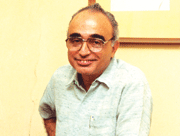 Homi N. Dastur, executive secretary and director general Bharatiya Vidya Bhavan (BVB), Mumbai. An English literature and journalism postgraduate of Bombay University who signed up with BVB in 1963, this septuagenerian educationist has been closely involved with the Bhavan’s activities for over 45 years.
Homi N. Dastur, executive secretary and director general Bharatiya Vidya Bhavan (BVB), Mumbai. An English literature and journalism postgraduate of Bombay University who signed up with BVB in 1963, this septuagenerian educationist has been closely involved with the Bhavan’s activities for over 45 years.
Founded by Kulapati K.M. Munshi on November 7, 1938, with the blessings of Mahatma Gandhi, Bharatiya Vidya Bhavan has steadily evolved into a nationwide intellectual, cultural and educational movement. During the past six decades this essentially liberal cultural organisation has promoted 64 schools, ten arts and science colleges, five professional management institutes and 367 constituent institutions and departments through its 119 centres across India and abroad. The aggregate student enrollment in BVB institutions is estimated at 300,000 and publications exceed 1,750 titles with aggregated sales of 30 million.
Representing the liberal face of Hinduism and its cultural heritage in particular, BVB’s initiatives in national integration, communal harmony, rural regeneration and probity in public life, which are integrated into its institutional curriculums, offer an education model worthy of emulation •
Global portal visionary
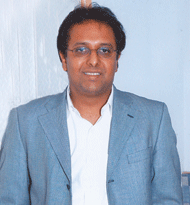 Kalyan Raman, founder chief executive of GlobalScholar Inc (USA). An alumnus of Guindy College of Engineering, Chennai with 16 years of experience in several Fortune 500 companies including Wal-Mart, Amazon.com and Blockbuster, Raman was appointed chief executive of the Seattle-based GlobalScholar Inc in September 2006 with the brief to design and operationalise the mother of all education portals positioned as an education supermall providing a rain of products and services. Within three months of taking charge he recruited a 65-strong Seattle-based NRI (non-resident Indians) dominated team and a 165-strong back office technical operations and content development team in Chennai and 13 months later on November 6, 2007 www.globalscholar.com became accessible to the public.
Kalyan Raman, founder chief executive of GlobalScholar Inc (USA). An alumnus of Guindy College of Engineering, Chennai with 16 years of experience in several Fortune 500 companies including Wal-Mart, Amazon.com and Blockbuster, Raman was appointed chief executive of the Seattle-based GlobalScholar Inc in September 2006 with the brief to design and operationalise the mother of all education portals positioned as an education supermall providing a rain of products and services. Within three months of taking charge he recruited a 65-strong Seattle-based NRI (non-resident Indians) dominated team and a 165-strong back office technical operations and content development team in Chennai and 13 months later on November 6, 2007 www.globalscholar.com became accessible to the public.
Globalscholar.com offers a B2C online tutoring platform where parents and students can connect with pre-screened educators who provide one-on-one tutoring, homework help or self-paced learning, and a B2B platform where schools can access its unique Curriculum Instructional Information System. Raman’s objective is to transform India into a major hub of distance education and technologically sophisticated online tutoring services. If this objective is realised GlobalScholar can dramatically improve student learning outcomes in India and impact it as a major provider of education services around the world •
Hi-tech education pioneer
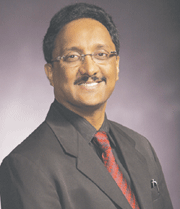 P. Kishore, promoter managing director, Everonn Systems India Ltd, Chennai. A pioneer visionary and among the first to introduce ICT (information communi-cations technologies) into school education, Kishore was educated in Ooty and
P. Kishore, promoter managing director, Everonn Systems India Ltd, Chennai. A pioneer visionary and among the first to introduce ICT (information communi-cations technologies) into school education, Kishore was educated in Ooty and
Coimbatore and began his career as a project consultant in Kochi in 1985. In 1987 he quit his job to promote a family-funded firm under the name and style of Systems International with the objective of introducing IT and ICT-enabled education into the primary-secondary schools sector. The firm got its first big break in 1999 when it bagged a contract with the Tamil Nadu state government to introduce IT education in 17 rural schools in the Nilgiris district.
This initiative proved to be a spectacular success and in the following year, when the firm was renamed Everonn Systems India Ltd (ESIL), the TN government awarded the newly-registered company a Rs.58 crore contract to set up computer labs in 332 government schools. Since then the company has diversified its product mix to provide classroom content, teacher training and computer labs in partnership with state governments to 4,157 schools in 12 states across the country.
Moreover in 2002 ESIL pioneered the establishment of virtual classrooms by connecting company-owned studios with education institutions across the country. Today ESIL’s seven hi-tech studios are connected with 700 private schools and colleges, 29 retail centres countrywide and provide two-way audio-video lectures to students via VSAT (very small aperture terminal).
Little wonder that in 2007 when the company made an IPO (initial public offer) of 3.5 million equity shares to raise Rs.50 crore, the issue was over-subscribed by an unprecedented 145 times. Evidently the investor public believes that under Kishore’s leadership, ESIL has introduced a high-potential new paradigm in ICT-enabled education which could bridge the country’s digital divide and catalyse an overdue teaching-learning revolution •
Girl child advocate
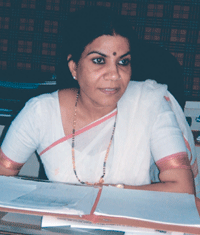 Rashmi Sinha, project director of Mahila Samakhya (MS), Lucknow. A Central government sponsored institution promoted in 1989 for the education and empowerment of women in rural areas, MS is spearheading a unique experiment in the education of adolescent girl children in nine states of the Indian Union. Under the Union HRD ministry’s Kasturba Gandhi Balika Vidyalaya (KGBV) scheme initiated in 2005, MS manages 23 upper primary residential schools in Uttar Pradesh, which house and educate 2,062 scheduled caste, scheduled tribe, OBC (other backward castes) and minority community adolescent girl children.
Rashmi Sinha, project director of Mahila Samakhya (MS), Lucknow. A Central government sponsored institution promoted in 1989 for the education and empowerment of women in rural areas, MS is spearheading a unique experiment in the education of adolescent girl children in nine states of the Indian Union. Under the Union HRD ministry’s Kasturba Gandhi Balika Vidyalaya (KGBV) scheme initiated in 2005, MS manages 23 upper primary residential schools in Uttar Pradesh, which house and educate 2,062 scheduled caste, scheduled tribe, OBC (other backward castes) and minority community adolescent girl children.
The objective of the KGBV initiative is to welcome back and mainstream girls who have dropped out of the school system. Spread across 15 of the state’s most backward districts, the number of girl children doesn’t quite indicate the importance of the KGBV initiative. According to Dr. Krishna Kumar, director of the Delhi-based National Council for Education, Research and Training, “MS-run KGBVs in UP have several special accomplishments which can be attributed to the larger and longer story of success.” (Economic and Political Weekly, June 28, 2008)
This larger story includes 64,669 women and 8,240 girl children in 3,857 villages of UP, who have broken gender barriers, fought for their rights, started cooperative savings programmes, promoted entrepreneurship and participated in village level politics, with support from Mahila Samakhya. In addition to the KGBVs, MS also runs 107 schools under the National Programme for Education of Girls in Elementary Education.
In a state notorious for its apathy to girl children (female literacy 42 percent, male-female sex ratio 1000:898), under Sinha’s leadership the MS-KGBV initiative, which has got off to a promising start, could well ignite a virtous revolution to uplift girl children •
School education revivalist
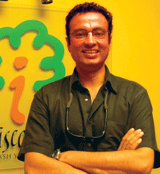 Ashish Rajpal, co-founder and chief executive, iDiscoveri India Pvt Ltd, Delhi. An alumnus of XLRI, Jamshedpur and Harvard University where he acquired a Masters in education as a student of Dr. Howard Gardner (author of the theory of multiple intelligences), Rajpal was marketing director of the Paris-based processed foods and consumer goods multinational Danone until 2001, when he returned to India to rejuvenate iDiscoveri, promoted in 1996 by a group of B-school and IIT graduates. Conceptualised as a social enterprise with a mission to renew education in India, since then iDiscoveri has established a reputation as India’s premier teacher education and school leadership development organisation.
Ashish Rajpal, co-founder and chief executive, iDiscoveri India Pvt Ltd, Delhi. An alumnus of XLRI, Jamshedpur and Harvard University where he acquired a Masters in education as a student of Dr. Howard Gardner (author of the theory of multiple intelligences), Rajpal was marketing director of the Paris-based processed foods and consumer goods multinational Danone until 2001, when he returned to India to rejuvenate iDiscoveri, promoted in 1996 by a group of B-school and IIT graduates. Conceptualised as a social enterprise with a mission to renew education in India, since then iDiscoveri has established a reputation as India’s premier teacher education and school leadership development organisation.
Earlier this year, following five years of research and field experience, iDiscoveri launched XSEED, India’s first integrated curriculum-cum-teacher education programme for primary and middle schools. Based on the National Curriculum Framework for School Education 2005, and designed by Rajpal, the XSEED programme is being implemented in primary and middle schools in ten states across India. A partner of Wipro and Bharti Telecom in their CSR initiatives in education, thus far iDiscoveri has worked with over 200 schools and trained 5,000 teachers and school leaders countrywide.
Also well known for its outdoor education programme Youreka, and its corporate leadership development program Crucible, driven by Rajpal and a phalanx of highly trained and motivated education professionals unencumbered by the dead hand of government, iDiscoveri is changing national mindsets and attitudes in Indian education.
Holistic education provider
 Arvind B. Vaidya, president, Indian Education Society (IES) Mumbai. A mechanical and electronics engineering graduate of Mumbai University, Vaidya began his career in Indian industry and served with the public sector Bharat Petroleum Co. Ltd for 35 years (1955-1990) rising to the position of general manager before he was appointed president of IES (estb. 1917) in 2002.
Arvind B. Vaidya, president, Indian Education Society (IES) Mumbai. A mechanical and electronics engineering graduate of Mumbai University, Vaidya began his career in Indian industry and served with the public sector Bharat Petroleum Co. Ltd for 35 years (1955-1990) rising to the position of general manager before he was appointed president of IES (estb. 1917) in 2002.
IES traces its origin to the KingGeorgeEnglishSchool established in Mumbai in 1917 following the visit of King George V to India. Since then this solitary school has transformed into IES, which currently manages 62 schools, one business management college and one architecture college. The 62 IES schools boast an enrollment of 60,585 students instructed by 800 teachers and 200 support staff.
Although a low-profile education group, over the past 90 years IES has built an impressive reputation in Mumbai for provision of holistic sports-oriented education. Among the high-profile India test cricketers IES has nurtured are Vijay and Sanjay Manjrekar, Sunil Gavaskar, Dilip Vengsarkar and Sachin Tendulkar who completed his primary education (upto class VII) in an IES school •
Teacher training millionaire
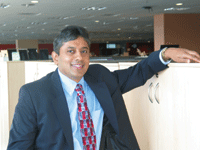 Dr. Praveen Vishakantaiah, president, Intel Technologies India Pvt. Ltd (Intel India). An electronics and communi-cations engineering alumnus of the National Institute of Technology, Thiruchirapalli and the University of Texas at Austin, Vishakantaiah presides over India’s largest and most widespread education-related CSR (corporate social responsibility) programme. Having trained a massive cohort of 900,000 (mainly government) K-12 pre-service, in-service, teacher educators and student teachers for a minimum of 60 hours to use new, 21st century information communication technologies (ICT) in their classrooms to dramatically improve teaching-learning outcomes, the Bangalore-based Intel India is all set to celebrate the milestone achievement of having ICT-trained 1 million teachers — equivalent to almost 15 percent of the country’s entire school teacher force — this month (November).
Dr. Praveen Vishakantaiah, president, Intel Technologies India Pvt. Ltd (Intel India). An electronics and communi-cations engineering alumnus of the National Institute of Technology, Thiruchirapalli and the University of Texas at Austin, Vishakantaiah presides over India’s largest and most widespread education-related CSR (corporate social responsibility) programme. Having trained a massive cohort of 900,000 (mainly government) K-12 pre-service, in-service, teacher educators and student teachers for a minimum of 60 hours to use new, 21st century information communication technologies (ICT) in their classrooms to dramatically improve teaching-learning outcomes, the Bangalore-based Intel India is all set to celebrate the milestone achievement of having ICT-trained 1 million teachers — equivalent to almost 15 percent of the country’s entire school teacher force — this month (November).
Under the global Intel Education Initiative, Intel India (a wholly-owned subsidiary of Intel Inc, USA) expends an estimated $5-10 million (Rs.25-50 crore) on ICT teacher and student (57,000 out-of-school and under-served children have been ICT-enabled) training — a year-on-year investment in developing human capital unmatched by any Indian corporate.
Intel India managers and Vishakantaiah in particular take pride in the fact that the Intel Education Initiative is a purely philanthropic CSR activity delivered free of charge to teachers and youth across the country. “Our broad objective is to create awareness of, and comfort with, technology in the educa-tion sector,” says Vishakantaiah •
World-ranked varsity VC
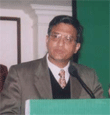 Dr. Deepak Pental, vice-chancellor, University of Delhi. An alumnus of Punjab and Rutgers universities, Pental commenced his career as a research fellow in Delhi University in 1978, which he has served for over three decades as professor of genetics; dean, faculty of interdisciplinary and applied sciences, and director of the Centre for Genetic Manipulation of Crop Plants, prior to being appointed vice-chancellor of India’s showpiece university in 2005. Widely acknowledged as contemporary India’s premier university with a string of highly reputed colleges including St. Stephen’s, Shri Ram College of Commerce, Miranda House and the Delhi School of Economics among others affiliated with it, as also for its own high-quality teaching and research notably in science, economics, English and commerce, DU comprises 14 faculties, 86 academic departments and 79 affiliated colleges with an aggregate enrollment of 220,000 students.
Dr. Deepak Pental, vice-chancellor, University of Delhi. An alumnus of Punjab and Rutgers universities, Pental commenced his career as a research fellow in Delhi University in 1978, which he has served for over three decades as professor of genetics; dean, faculty of interdisciplinary and applied sciences, and director of the Centre for Genetic Manipulation of Crop Plants, prior to being appointed vice-chancellor of India’s showpiece university in 2005. Widely acknowledged as contemporary India’s premier university with a string of highly reputed colleges including St. Stephen’s, Shri Ram College of Commerce, Miranda House and the Delhi School of Economics among others affiliated with it, as also for its own high-quality teaching and research notably in science, economics, English and commerce, DU comprises 14 faculties, 86 academic departments and 79 affiliated colleges with an aggregate enrollment of 220,000 students.
A globally renowned crops genetics scientist in his own right, unlike his predecessors in office, Pental keeps a low public profile while maintaining his academic focus. An active member of the National Academy of Agricultural Sciences, National Academy of Sciences, IndianAcademy of Sciences and IndianNationalScienceAcademy, he also serves on the governing council of the CSIR (Council for Scientific and Industrial Research).
Last year, DU was ranked (254) among the world’s top 500 universities by the Times Higher Education Supplement •
IT education guru
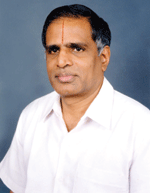 Prof. S. Sadagopan, founder-director, Indian Institute of Information Technology, Bangalore (IIIT-B). An alumnus of Madras and Purdue universities, Sadagopan taught at IIT-Kanpur, IIM-Bangalore, and Rutgers University, USA, prior to being appointed founder-director of IIIT-B — a state-of-the-art postgrad IT education institution promoted jointly by the Karnataka state government and IT industry majors at a capital cost of Rs.300 crore.
Prof. S. Sadagopan, founder-director, Indian Institute of Information Technology, Bangalore (IIIT-B). An alumnus of Madras and Purdue universities, Sadagopan taught at IIT-Kanpur, IIM-Bangalore, and Rutgers University, USA, prior to being appointed founder-director of IIIT-B — a state-of-the-art postgrad IT education institution promoted jointly by the Karnataka state government and IT industry majors at a capital cost of Rs.300 crore.
During the past eight years IIIT-B (estb.2000) has acquired a formidable reputation as a premier graduate school on a par with the IIMs and IITs, with a rich resource of high-quality IT professionals. The institute’s 24/7 fully wired and landscaped 10-acre campus in Bangalore’s ElectronicCity houses its academic and hostel blocks, library and internet centre.
IIIT-B’s annual output of 120 plus postgrads, acknowledged as the cream of IT industry-ready graduates, are snapped up by both Indian companies and MNCs. During the past three years under Sadagopan’s leadership IIIT-B has promoted several autonomous cutting edge research centres under the public-private partnership model. They include C-BIT (Center for Banking & IT); C-AIT (Center for Automotive IT); C-TEL (Center for Telecom Research) and C-IIT (Center for Industrial Automation & IT).
BOOT model pioneer
.gif) Shantanu Prakash, chairman and chief executive, Educomp Solutions Ltd (ESL). Innovator of a unique BOOT (build, own, operate and transfer) model to enable teachers and students across the country to utilise new ICT (instructional communication technologies) to improve classroom teaching-learning outcomes, and for schools to painlessly become owners of sophisticated computer labs within a five-year period, Prakash has developed ESL into India’s most valuable listed company in terms of market capitalisation and a darling of the stock exchanges after he took the company public in 2006. A graduate of Shriram College of Commerce, Delhi and IIM-Ahmedabad, who famously abjured tempting corporate job offers, Prakash promoted the Delhi (Gurgaon)-based ESL in 1988 to serve the dormant needs of K-12 education. Currently ESL provides IT infrastructure, digitised curriculum and content, and teacher training services to 1,200 private schools and 7,300 government schools countrywide, where over 5 million students learn the ICT way by paying modest user fees of between Rs.80-150 per month.
Shantanu Prakash, chairman and chief executive, Educomp Solutions Ltd (ESL). Innovator of a unique BOOT (build, own, operate and transfer) model to enable teachers and students across the country to utilise new ICT (instructional communication technologies) to improve classroom teaching-learning outcomes, and for schools to painlessly become owners of sophisticated computer labs within a five-year period, Prakash has developed ESL into India’s most valuable listed company in terms of market capitalisation and a darling of the stock exchanges after he took the company public in 2006. A graduate of Shriram College of Commerce, Delhi and IIM-Ahmedabad, who famously abjured tempting corporate job offers, Prakash promoted the Delhi (Gurgaon)-based ESL in 1988 to serve the dormant needs of K-12 education. Currently ESL provides IT infrastructure, digitised curriculum and content, and teacher training services to 1,200 private schools and 7,300 government schools countrywide, where over 5 million students learn the ICT way by paying modest user fees of between Rs.80-150 per month.
In May, Prakash inked an agreement with the Singapore-based Raffles Education Corporation, the largest education provision group in the Asia Pacific region, under which the two companies will introduce the entire suite of ESL’s products and services in China. Moreover earlier this year ESL promoted its Roots and Wings division which will roll out a countrywide chain of pre-schools for children in the age group two-six and has drawn up a plan to promote 150 bricks and mortar K-12 ‘Millennium’ schools across the country.
Quite obviously this visionary education entrepreneur is in a hurry to engineer Indian education’s belated great leap forward •
Stellar B-school leader
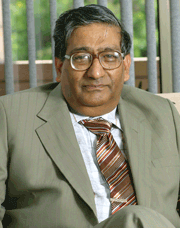 Dr. M. Rammohan Rao, director Indian School of Business, Hyderabad. An alumnus of Anna (Chennai), Cornell, and Carnegie Mellon (USA) universities, Rao began his career as a research assistant at Cornell in 1963. In 1975 he was invited to join the faculty of the Indian Institute of Management, Bangalore (IIM-B) where he rose to the position of director in 1997.
Dr. M. Rammohan Rao, director Indian School of Business, Hyderabad. An alumnus of Anna (Chennai), Cornell, and Carnegie Mellon (USA) universities, Rao began his career as a research assistant at Cornell in 1963. In 1975 he was invited to join the faculty of the Indian Institute of Management, Bangalore (IIM-B) where he rose to the position of director in 1997.
In 2004, Rao was appointed dean and director of the IndianSchool of Business (ISB), Hyderabad, promoted in 2001 by a stellar constellation comprising some of the biggest names in private sector Indian industry with a massive outlay of Rs.250 crore. Sprawled over 250 acres in Gachibowli on the periphery of Hyderabad, this state-of-the-art B-school was established in academic collaboration with the Kellogg School of Business at Wharton and StanfordBusinessSchool.
Its innovation has been the introduction of a 13-month intensive MBA programme and the levy of market determined tuition fees, currently a chastening Rs.19 lakh. ISB’s postgrad MBA programme is open only to grad-uate professionals with a minimum of two years industry experience.
Despite ISB’s diploma not being ‘recognised’ by AICTE, Delhi, the number of students ready, willing and able to pay its market-determined tuition fees has increased from 273 in 2006 to 442 currently •
Fast track educationist
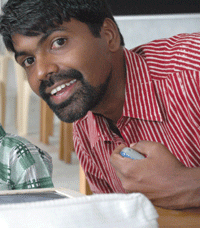 Satya Narayanan R, chairman, Career Launcher India Pvt. Ltd. An alumnus of St. Stephen’s College, Delhi and IIM-Bangalore, Narayanan quit a plum job at Ranbaxy Laboratories Ltd in 1995 at age 24, to start a tutorial centre in a small room in Delhi for B-school aspirants with an initial investment of Rs.360. Currently, Career Launcher (CL) has an annual revenue of Rs.70 crore generated through its 160 centres offering test preparatory tuition to 100,000 students writing a plethora of public entrance exams including CAT, GRE, GMAT, TOEFL, GATE, etc. With its 160 state-of-the-art fully-wired CL tutorial centres manned by 300 faculty (a majority of whom are IIM and IIT alumni) acknowledged as among the best in the country, in 2006 Narayanan diversified into the promotion of bricks-and-mortar education institutions including schools and colleges across India.
Satya Narayanan R, chairman, Career Launcher India Pvt. Ltd. An alumnus of St. Stephen’s College, Delhi and IIM-Bangalore, Narayanan quit a plum job at Ranbaxy Laboratories Ltd in 1995 at age 24, to start a tutorial centre in a small room in Delhi for B-school aspirants with an initial investment of Rs.360. Currently, Career Launcher (CL) has an annual revenue of Rs.70 crore generated through its 160 centres offering test preparatory tuition to 100,000 students writing a plethora of public entrance exams including CAT, GRE, GMAT, TOEFL, GATE, etc. With its 160 state-of-the-art fully-wired CL tutorial centres manned by 300 faculty (a majority of whom are IIM and IIT alumni) acknowledged as among the best in the country, in 2006 Narayanan diversified into the promotion of bricks-and-mortar education institutions including schools and colleges across India.
Within two years Narayanan has operationalised two fully-fledged K-12 schools branded IndusWorldSchool in Indore and Hyderabad, and three pre-schools branded Ananda in Hyderabad, Noida and Indore. That’s not all. An Indus World School of Business in Noida on the outskirts of Delhi is fully operational and has applied for deemed university status. Moreover several vocational schools including an ITI, are being revamped under the public-private partnership model.
Also on Narayanan’s drawing board are 250 mid-market K-12 schools and a chain of low-cost schools over the next few years. Stand by for the emergence of an education sector heavyweight •
Rapid growth driver
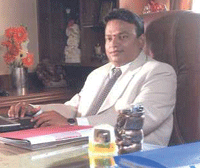 Dr. Ishari K. Ganesh, chancellor, Vels University, Chennai. From modest beginnings in 1992 as a pharmacy college with just 20 students, the Vels group of institutions, promoted by Ishari K. Ganesh under the aegis of the Vel’s Educational Trust, has blossomed into an education conglomerate comprising 15 colleges and three primary-secondary schools offering quality education to over 11,000 students instructed by 640 faculty. LastJuneVelsUniversity was conferred deemed university status by the Delhi-based University Grants Commission. An alumnus of Madras and MaduraiKamarajUniversity, Ganesh is a staunch believer in the philosophy ‘work is worship’.
Dr. Ishari K. Ganesh, chancellor, Vels University, Chennai. From modest beginnings in 1992 as a pharmacy college with just 20 students, the Vels group of institutions, promoted by Ishari K. Ganesh under the aegis of the Vel’s Educational Trust, has blossomed into an education conglomerate comprising 15 colleges and three primary-secondary schools offering quality education to over 11,000 students instructed by 640 faculty. LastJuneVelsUniversity was conferred deemed university status by the Delhi-based University Grants Commission. An alumnus of Madras and MaduraiKamarajUniversity, Ganesh is a staunch believer in the philosophy ‘work is worship’.
Currently VelsUniversity offers AICTE approved study programmes in pharmacy, physiotherapy, hotel management, maritime studies, business administration, engineering and technology, teacher training, education, nursing and dentistry in its 15 affiliated colleges spread over three campuses in Chennai. The Vels group also offers K-X education in the CBSE affiliated Vels Vidyashram and higher secondary (classes XI-XII) education in the state board affiliated Vels Higher Secondary School, apart from internationally benchmarked primary schooling in its Vels Billabong High International School (estb. 2004).
Educationists in Chennai attribute the rapid growth of the Vels Group to Ganesh’s drive and commitment, as evidenced by heavy investment in infrastructure in all its colleges and schools, and the diversity of its study programmes •
Hinterland education champion
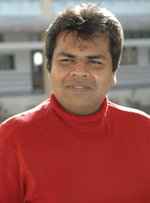 Adittya Mody, executive coordinator, Satyanarayan Sagarmal Mody Educa-tion Trust, Jhunjhunu (Rajasthan). A commerce graduate of Bombay University, and chief executive of Eve Fabrics Pvt. Ltd (estb. 1934), a company engaged in the business of global sourcing of textiles, Mody’s most notable achievement in education is that he has made a rare and determined effort to introduce high-quality globally bench-marked primary-secondary education in the rural hinterland of Rajasthan.
Adittya Mody, executive coordinator, Satyanarayan Sagarmal Mody Educa-tion Trust, Jhunjhunu (Rajasthan). A commerce graduate of Bombay University, and chief executive of Eve Fabrics Pvt. Ltd (estb. 1934), a company engaged in the business of global sourcing of textiles, Mody’s most notable achievement in education is that he has made a rare and determined effort to introduce high-quality globally bench-marked primary-secondary education in the rural hinterland of Rajasthan.
A family education initiative named after Mody’s grandfather, the late Satyanarayan Mody (1925-2000) who promoted three primary schools in his hometown of Jhunjhunu (pop.1.04 lakh) in Rajasthan for 3,500 socio-economically disadvantaged children, currently the S.S. Mody Education Trust (estb. 2004) also runs the K-12, CBSE affiliated Vidya Vihar School (promoted by his father, Chandrakant) for 680 children; and the S.S. Mody Cambridge International School with an aggregate enrollment of 82 pupils. Promoted in 2006, the latter institution is affiliated with the UK-based Cambridge International Examinations board and is equipped with a state-of-the-art library, laboratory and electronic smartboards introduced for the first time in quasi-rural Rajasthan.
Also co-promoter of the Hindi edition of EducationWorld, unlike most of India’s business philanthropists, Mody is determined to make high quality K-12 education accessible to the aspirational new middle class emerging in small town and rural India •
Abacus maths pioneer
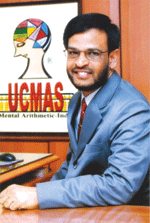 Basheer Ahamad, chairman and managing director, U C MAS Mental Arithmetic (India) Pvt. Ltd. An alumnus of BharathidasanUniversity, Chennai-based entrepreneur Basheer Ahamad promoted U C MAS India (Universal Concept Mental Arithmetic System Pvt. Ltd) to introduce the Chinese abacus maths learning system in India in 1999. Since then U C MAS India, a franchisee of the Global Akademi Sempoaand Mental Aritmetik U C MAS Sdn.Bhd. Malaysia and Zhusuan Association, has grown into India’s largest supplementary maths tuition company with 1,850 franchised centres in 26 states with an aggregate enrollment of 250,000 students.
Basheer Ahamad, chairman and managing director, U C MAS Mental Arithmetic (India) Pvt. Ltd. An alumnus of BharathidasanUniversity, Chennai-based entrepreneur Basheer Ahamad promoted U C MAS India (Universal Concept Mental Arithmetic System Pvt. Ltd) to introduce the Chinese abacus maths learning system in India in 1999. Since then U C MAS India, a franchisee of the Global Akademi Sempoaand Mental Aritmetik U C MAS Sdn.Bhd. Malaysia and Zhusuan Association, has grown into India’s largest supplementary maths tuition company with 1,850 franchised centres in 26 states with an aggregate enrollment of 250,000 students.
Amazed by the mathematical prowess of young Chinese students and inspired by the success of the abacus maths learning system in South-east Asia, Ahamad introduced U C MAS Memory Technique for middle, high, higher secondary and college students and a special programme for business executives through its subsidiary U C MAS Memory Technique India Pvt. Ltd (estb. 2004).
Not content to rest on his laurels, Ahamad’s attention is now focused upon extending abacus-based maths learning programmes to government school students through the state’s education department. Business success apart, Ahamad’s special achievement is that he infused an element of fun and competitiveness into the learning of maths, as testified by the large number of students flocking to UC MAS franchised centres across the country •
Heavyweight division educator
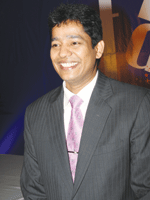 Mahesh Shetty, chairman and chief executive MT Educare Pvt. Ltd, Mumbai. The holding company of Mahesh Tutorials, which is a household name in supplementary and exam preparation education in Maharashtra, and increasingly across India, MT Educare was started by Shetty, a science and education graduate of MumbaiUniversity as a lone tutorial centre with 400 students in 1988. Since then, Mahesh Tutorials has grown and expanded into one of India’s heavyweight division supplementary education companies. The USP (unique sales proposition) of Mahesh Tutorials is that it provides tuition and tutorial services across the entire education spectrum — from pre-school to postgraduation.
Mahesh Shetty, chairman and chief executive MT Educare Pvt. Ltd, Mumbai. The holding company of Mahesh Tutorials, which is a household name in supplementary and exam preparation education in Maharashtra, and increasingly across India, MT Educare was started by Shetty, a science and education graduate of MumbaiUniversity as a lone tutorial centre with 400 students in 1988. Since then, Mahesh Tutorials has grown and expanded into one of India’s heavyweight division supplementary education companies. The USP (unique sales proposition) of Mahesh Tutorials is that it provides tuition and tutorial services across the entire education spectrum — from pre-school to postgraduation.
In pre-school education MT Educare runs a ten-strong chain of play schools and ten childcare centres under the name and style of Little Tigers. In primary-secondary education, it offers private tuition to 30,000 children enrolled in CISCE, CBSE and state board affiliated schools.
In higher education Mahesh Tutorials’ 151 centres across the country provide tuition to Plus Two students in the commerce, engineering and science streams and prepare them for collegiate and university exams including the Maharashtra and Gujarat government’s Common Entrance Test (CET) as also for the more rigorous All India Engineering Entrance Examinations (AIEEE) and the entrance exam of the IITs (IIT-JEE). Moreover latterly, MT Educare — which has planted its corporate flag in Mumbai, Pune, Nashik, Nagpur, Aurangabad, Mangalore, Udupi, Mysore, Bangalore, Chennai and Hyderabad — has diversified into provision of English language, retail training and related learning programmes to the corporate sector.
Little wonder that recently MT Educare became India’s first supplementary education enterprise to receive venture capital funding, from the Mauritius-based Helix Investments, which purchased a 30 percent equity stake for $8 million (Rs.40 crore) giving the Mumbai-based company a market valuation of $26.6 million (Rs.133 crore) •